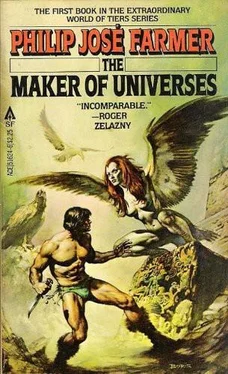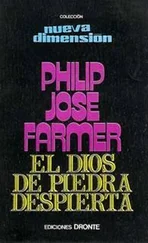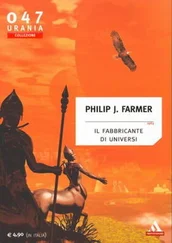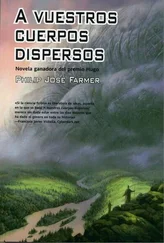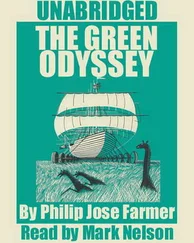The next afternoon, sitting under a canopy erected for their comfort, Kickaha presented the captain with the ruby, enormous and beautifully cut. With it, Kickaha could have purchased the boat itself and the crew from the captain. He hoped that Arkhyurel would be more than satisfied with it; the captain himself could retire on its sale if he wished. Kickaha then did what he had wanted to avoid but knew that he could not. He brought out the rest of the jewels: diamonds, sapphires, rubies, garnets, tourmalines and topazes. Arkhyurel smiled and licked his lips and fondled the stones for three hours. Finally he forced himself to give them back.
That night, while lying on their beds on the deck, Kickaha brought out a parchment map which he had borrowed from the captain. He indicated a great bend of the river and tapped a circle marked with the curlicue syllabary symbols of Khamshem writing.
“The city of Khotsiqsh. Abandoned by the people who built it, like the one from which we boarded this boat, and inhabited by a half-savage tribe, the Weezwart. We’ll quietly leave the ship the night we drop anchor there and cut across the thin neck of land to the river. We may be able to pick up enough time to intercept the boat that’s carrying the gworl. If we don’t, we’ll still be way ahead of this boat. We’ll take another merchant. Or, if none is available, we’ll hire a Weezwart dugout and crew.”
Twelve days later the Khrillquz tied up alongside a massive but cracked pier. The Weezwart crowded the stone tongue and shouted at the sailors and showed them jars of dhiz, and of laburnum, singing birds in wooden cages, monkeys and servals on the end of leashes, artifacts from hidden and ruined cities in the jungle, bags and purses made from the pebbly hides of the river saurians, and cloaks from tigers and leopards. They even had a baby axeback, which they knew the captain would pay a price for and would sell to the Bashishub, the king, of Shibacub. Their main wares, however, were their women. These, clad from head of foot in cheap cotton robes of scarlet and green, paraded back and forth on the pier. They would flash open their robes and then quickly close them, all the while screaming the price of a night’s rent to the women-starved sailors. The men, wearing only white turbans and fantastic codpieces, stood to one side, chewed dhiz, and grinned. All carried six-foot-long blow-guns and long, thin, crooked knives stuck into the tangled knots of hair on top of their heads.
During the trading between the captain and Weezwart, Kickaha and Wolff prowled through the cyclopean stands and falls of the city. Abruptly, Wolff said, “You have the jewels with you. Why don’t we get a Weezwart guide and take off now? Why wait until nightfall?”
“I like your style, friend,” Kickaha said. “Okay. Let’s go.”
They found a tall thin man, Wiwhin, who eagerly accepted their offer when Kickaha showed him a topaz. At their insistence, he did not tell his wife where he was going but straightway led them into the jungle. He knew the paths well and, as promised, delivered them to the city of Qirruqshak within two days. Here he demanded another jewel, saying that he would not tell anybody at all about them if he was given a bonus.
“I did not promise you a bonus,” Kickaha said. “But I like the fine spirit of free enterprise you show, my friend. So here’s another. But if you try for a third, I shall kill you.”
Wiwhin smiled and bowed and took the second topaz and trotted off into the jungle. Kickaha, staring after him, said, “Maybe I should’ve killed him anyway. The Weezwart don’t even have the word honor in their vocabulary.”
They walked into the ruins. After a half-hour of climbing and threading their way between collapsed buildings and piles of dirt, they found themselves on the river-side of the city. Here were gathered the Dholinz, a folk of the same language family as the Weezwart. But the men had long, drooping moustaches and the women painted their upper lips black and wore nose-rings. With them was a group of merchants from the land which had given all the Khamshem-speakers their name. There was no river-caravel by the pier. Kickaha, seeing this, halted and started to turn back into the ruins. He was too late, for the Khamshem saw him and called out to them.
“Might as well brave it out,” Kickaha muttered to Wolff. “If I holler, run like hell! Those birds are slave-dealers.”
There were about thirty of the Khamshem, all armed with scimitars and daggers. In addition, they had about fifty soldiers, tall broad-shouldered men, lighter than the Khamshem, with swirling patterns tattooed on their faces and shoulders. These, Kickaha said, were the Sholkin mercenaries often used by the Khamshem. They were famous spearmen, mountain people, herders of goats, scorners of women as good for nothing but housework, fieldwork, and bearers of children.
“Don’t let them take you alive,” was Kickaha’s final warning before he smiled and greeted the leader of the Khamshem. This was a very tall and thickly muscled man named Abiru. He had a face that would have been handsome if his nose had not been a little too large and curved like a scimitar. He answered Kickaha politely enough, but his large black eyes weighed them as if they were so many pounds of merchandisable flesh.
Kickaha gave him the story he had told Arkhyurel but shortened it considerably and left out the jewels. He said that they would wait until a merchant boat came along and would take it back to Shiashtu. And how was the great Abiru doing?
(By now, Wolff’s quickness at picking up languages enabled him to understand the Khamshem tongue when it was on a simple conversational basis.)
Abiru replied that, thanks to the Lord and Tartartar, this business venture had been very rewarding. Besides the usual type of slave-material picked up, he had captured a group of very strange creatures. Also, a woman of surpassing beauty, the like of which had never been seen before. Not, at least, on this tier.
Wolff’s heart began to beat hard. Was it possible?
Abiru asked if they would care to take a peek at his captives.
Kickaha flicked a look of warning at Wolff but replied that he would very much like to see both the curious beings and the fabulously beautiful woman. Abiru beckoned to the captain of the mercenaries and ordered him and ten of his men to come along. Then Wolff scented the danger of which Kickaha had been aware from the beginning. He knew that they should run, though this was not likely to be successful. The Sholkin seemed accustomed to bringing down fugitives with their spears. But he wanted desperately to see Chryseis again. Since Kickaha made no move, Wolff decided not to do so on his own. Kickaha, having more experience, presumably knew how best to act.
Abiru, chatting pleasantly of the attractions of the capital city of Khamshem, led them down the underbrush-grown street and to a great stepped building with broken statues on the levels. He halted before an entrance by which stood ten more Sholkin. Even before they went in, Wolff knew that the gworl were there. Riding over the stink of unwashed human bodies was the rotten-fruit odor of the bumpy people.
The chamber within was huge and cool and twilighty. Against the far wall, squatting on the dirt piled on the stone floor, was a line of about a hundred men and women and thirty gworl. All were connected by long, thin iron chains around iron collars about their necks.
Wolff looked for Chryseis. She was not there.
Abiru, answering the unspoken question, said, “I keep the cat-eyed one apart. She has a woman attendant and a special guard. She gets all the attention and care that a precious jewel should.”
Wolff could not restrain himself. He said, “I would like to see her.”
Abiru stared and said, “You have a strange accent. Didn’t your companion say you were from the land of Shiashtu, also?”
Читать дальше
